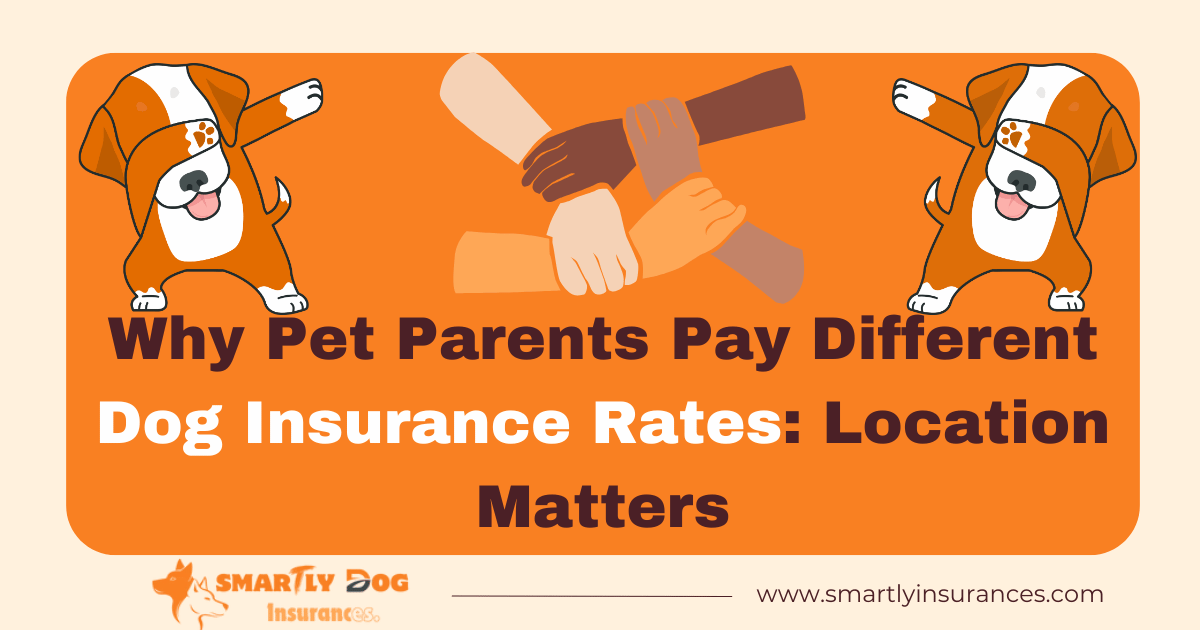Pet parents might be surprised to learn how their location affects their dog’s insurance costs. Dog owners in California pay an average of $61.29 monthly, while Texas residents pay only $41.65 for the same coverage.
Location impacts extend well beyond state lines. Living in cities means higher premiums than rural areas because veterinary care costs more in metropolitan regions. The United States has an average monthly pet insurance premium of $49.51 for dogs, but this amount varies substantially based on your location.
These geographic differences shape your monthly premiums in unique ways. You can still find the best rates in your area by understanding these location-based factors and using them to make smart choices about your pet’s insurance coverage.
Why Location Changes Your Dog Insurance Rate
The cost of pet insurance changes a lot depending on where you live. Three main factors shape these local market differences.
Veterinary care costs differ by city
Pet owners in San Francisco pay some of the highest veterinary bills in the country, with average dog vet visits costing $624.25. The city’s highest vet bill reached $22,362.90. Urban veterinary service prices went up by 7.9% from February 2023 to February 2024. These medical costs drive insurance premiums up because insurers must match their rates to local veterinary expenses.
State insurance regulations affect prices
Each state has its own way of handling pet insurance, which creates big differences in coverage and costs. To name just one example:
- California is the only state that has detailed pet insurance laws
- A major insurer asked for a 48.9% price increase in Florida
- Washington and Mississippi added new consumer protection rules in 2023
Cost of living affects premiums
The local cost of living relates directly to veterinary costs and insurance rates. A pet owner in Los Angeles pays much more per vet visit than someone in Sioux City, Iowa. The difference shows up clearly in monthly premiums – pet owners in Jacksonville might pay just $23.00 monthly, while dog owners in New York City could see premiums as high as $63.00 for similar coverage.
These local differences come from many sources, including how many veterinary specialists are available, what facilities cost to run, and which breeds are popular in different areas. The veterinary industry has changed too – large chains now own about 25% of the nation’s 30,000 veterinary clinics.
Understanding Your Local Pet Insurance Costs
Nationwide data shows some fascinating patterns in pet insurance costs. NAPHIA’s latest report reveals that dog owners pay an average monthly premium of $49.51, while cat insurance averages $28.48.
Average rates by region
Monthly premiums vary significantly across states. New York tops the list with average dog insurance rates of $61.05, which we traced to higher metropolitan veterinary costs. Wyoming offers the most affordable rates at $33.97. Here’s how neighboring states match up:
| State | Monthly Dog Premium |
|---|---|
| California | $61.29 |
| Oregon | $45.65 |
| Washington | $43.63 |
Urban vs rural price differences
Premium calculations highlight the stark contrast between city and countryside rates. A ground example shows that similar coverage in New York City costs $90.00 monthly, but drops to $45.00 in nearby Hudson.
Urban areas demand higher premiums because veterinary services cost more in metropolitan regions. Seattle’s pet owners pay $68.00 monthly to insure a Labrador Retriever. This rate exceeds Austin by $20.00, where residents pay $48.00 for the same breed and plan.
Several factors drive these premium variations. Downtown veterinarians charge more than their rural counterparts. Limited access to animal hospitals in certain areas creates different pricing structures. This explains why similar pets in neighboring zip codes often have different premium rates.
How Different States Handle Pet Insurance
“Like all types of insurance, pet insurance is highly regulated on the state level. Each state has different requirements for insurers and their services. Because of this, some providers need to offer different plan options and benefits based on what is allowed in each state. This can have a direct impact on the cost of providing premiums on the state level.” — AKC Pet Insurance, Leading pet insurance provider
Pet insurance rules have seen big changes in America. California led the way with specific pet insurance laws in 2014. These laws set new standards for policy disclosures and coverage limits.
State-specific coverage rules
The National Association of Insurance Commissioners created a model law that guides state pet insurance regulations. Maine, Mississippi, and Washington now follow this framework. The law requires:
- 15-day policy examination period with refund rights
- Clear explanations of claims payment formulas
- No waiting periods for accident coverage
- 30-day maximum waiting periods for illness coverage
Required benefits by location
California’s latest changes give consumers better protection by making insurers explain age-based premium changes and location-based pricing clearly. Maryland has also put new rules in place that require:
- Detailed policy exclusion disclosures
- Waiting period specifications
- Benefits schedule explanations
Most U.S. states still don’t have specific pet insurance rules. Right now, only four states – California, Maine, Mississippi, and Washington – have complete pet insurance laws. New York stands out with unique rules that stop insurers from denying coverage based on dog breeds.
Pet insurance follows standard casualty insurance rules in states without specific laws. This means consumer protection and policy requirements vary depending on where you live.
Smart Ways to Lower Your Local Rate
Smart planning and market knowledge help you find affordable pet insurance. We focused on available discounts and comparison tools that can reduce your premiums.
Compare multiple providers
The best coverage comes from checking multiple quotes instead of taking the first offer. PawlicyAdvisor and Policygenius let you compare different providers side by side. These platforms look at coverage options, customer reviews, and how quickly companies process claims to help you decide.
Ask about regional discounts
You can save money in several ways based on your situation:
- Military service members can save up to 15% through providers like USAA and Armed Forces
- Multi-pet households qualify for 5-10% discounts with ASPCA, Hartville, and PetFirst
- Costco members receive 15% off premiums, and Executive members get extra perks
- Professional organizations offer special rates – NAR members save 10% on base premiums
Think about annual payment options
Paying annually instead of monthly can save you money. Many providers, including Lemonade, give premium discounts for annual payments. You can also save up to 5% by bundling pet insurance with your home or car insurance through companies like Nationwide and Progressive.
You can create a plan that matches your budget by adjusting coverage limits, deductibles, and reimbursement rates. Customer ratings and reviews show how well providers handle claims, so check them carefully.
Last Words
Your location matters a lot in choosing the right dog insurance coverage. Pet parents who live in cities pay more because vet costs are higher, but rural areas offer more affordable rates. These price differences come from local healthcare costs, state rules, and the cost of living in different areas.
Each state’s rules shape insurance options by a lot. California has the most complete pet insurance laws in place, but other states still treat these policies like regular insurance products. This creates big differences in what’s covered and how consumers are protected in different places.
Pet parents can get better rates by making smart decisions. They save money by checking multiple providers, looking for local discounts, and paying annually. On top of that, they can adjust coverage limits and deductibles to match their local vet costs and budget.
Location is just one piece of your pet insurance cost puzzle. You need to understand both your area’s influence and ways to save money to make good choices about coverage. This helps you get the right protection for your furry family member at a fair price, no matter where you live.



